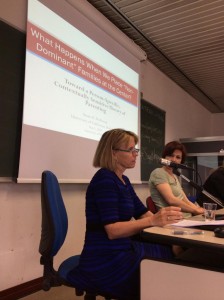
Susan Holloway
Unforseen subjectivities: Same-sex parenting and the new boundaries of what it means to be a parent
International conference, 5th May 2015 – University of Verona
Parenting is not a collection of static functions, but a process in which parents interact and negotiate with the world, a world in which norms, culture, and widely-held discourses define the boundaries of what it means to be parent, with concomitant effects on the practices of social and health service providers as well as educators.
The experience of same-sex parents is a vantage point that brings to the surface this process of construction and makes evident a disconnection between the experience of individuals/couples and the symbolic space available for being recognized as parents.
The conference’s work moves from a consideration of same-sex parenting not as a specific and segmented type of parent but as a privileged vantage point for examining the complexity of contemporary life, where the symbolic rupture of the gay couple and the origins of children conceived through methods external to the couple require a complex respositioning of perceptions and knowledge.
The objective of the conference is to open up an interdisciplinary perspective that — through a comparison between positions, conceptual categories, and methodological tools — can contribute to a discourse that focuses on parenting as a subjective experience and a complex social phenomenon, the expression of a way to be and to develop one’s own subjectivity.
In this perspective, same-sex parenting challenges the adequacy of our theoretical categories for interpreting the world as well as the practices implemented by services and schools towards these changing family forms.
Program
Introduction: Federica de Cordova, Chiara Sità
Same-sex parenting: Challenges for research
Jaqui Gabb, Open University, UK, Unsettling relationships: How do we research and understand same-sex parent families?
Paolo Inghilleri, Università Statale di Milano: IThe paradox of culture between DENSITA and insecurity: subjective experiences, parenting, and change.
Rossana Di Silvio, Università di Milano Bicocca: Between “being” and “doing” parents: the challenge of adoptive kinship
Laura Formenti, Università di Milano Bicocca: Deconstructing the idea of family: The added value of research
New boundaries for being a parent: What is the role of services?
Susan D. Holloway, UC Berkeley, USA: What happens when we place “non-dominant” families at the centre? Towards a person-based, contextually sensitive theory of parenting
Chiara Bertone, Università del Piemonte Orientale: The perspective of family practices as a training strategie: Reflections from experiences in Torino
Alessandra Gigli, Università di Bologna: Welcoming the diversity of families: Coordination of educational alliances
